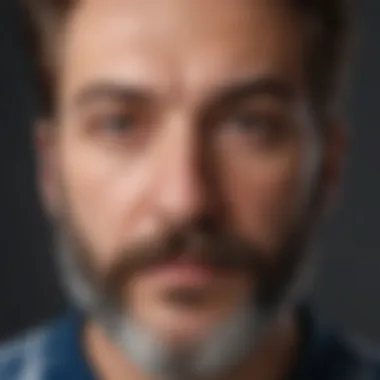Exploring the Influence of Beard Culture on 'Ted Lasso' in Modern Media


Industry Insights
The portrayal of beard culture in the hit TV series 'Ted Lasso' offers a unique lens through which to examine societal norms and trends. Facial hair, particularly beards, has garnered increasing attention in modern culture as a symbol of masculinity, individuality, and style. 'Ted Lasso' showcases various characters sporting distinct types of beards, each carrying its own significance that resonates with a diverse audience. This section delves into the deeper implications of beard culture as depicted in the show, exploring its impact on viewers and shedding light on the evolving perceptions surrounding facial hair.
Reviews & Recommendations
In 'Ted Lasso', the representation of beard culture serves as a pivotal element that contributes to character development and storytelling. The show's creators leverage facial hair as a visual cue to convey personality traits, values, and emotional journeys of the characters. Through a critical analysis of how beards are used as narrative devices in 'Ted Lasso', this section evaluates the effectiveness of this approach in enhancing viewer engagement and empathy. Additionally, it offers recommendations for audiences interested in exploring similar themes through other media forms, providing insights into compelling storytelling techniques centered around facial hair symbolism.
News & Updates
As 'Ted Lasso' continues to captivate global audiences, discussions surrounding its portrayal of beard culture have sparked new dialogues within the entertainment industry. From casting announcements to behind-the-scenes revelations, the show's handling of facial hair aesthetics has garnered attention from both fans and critics alike. This section highlights the latest news and updates related to 'Ted Lasso', shedding light on the impact of beard culture representation on audience perception and industry trends. By examining the evolving media landscape through the lens of facial hair trends, readers gain a nuanced understanding of how 'Ted Lasso' influences popular culture narratives.
Feature Articles
Exploring the socio-cultural implications of beard culture in 'Ted Lasso', this section dives deep into the symbolic meanings associated with facial hair within the context of the show. By analyzing iconic characters and their distinctive beard styles, readers gain insights into the subtle nuances of expressing identity and values through grooming choices. Additionally, this feature article presents a comparative study of beard representations across different genres, drawing parallels between 'Ted Lasso' and other prominent media platforms. Through in-depth analyses and thought-provoking discussions, readers engage with the intricate relationship between beard culture and narrative storytelling, offering a fresh perspective on the intersection of grooming practices and character portrayal.
Introduction
In the vast tapestry of pop culture, certain trends emerge that not only capture our attention but also shape societal norms and perceptions. One such phenomenon that has been gaining momentum is the intricately woven relationship between beard culture and its portrayal in popular media. This article serves as a critical exploration into the impact of beard culture on the hit TV series 'Ted Lasso'. By delving deep into the significance of facial hair, specifically beards, in contemporary society and dissecting how they are represented in mainstream media like 'Ted Lasso', we aim to illuminate the underlying meanings and ramifications associated with this burgeoning trend.


As we embark on this journey, it becomes essential to unravel the multifaceted layers that surround this topic. Beard culture stands poised at the intersection of history, psychology, and visual symbolism. Understanding its implications in a modern context requires us to probe beyond the surface narratives and venture into the nuanced realms of social perception, celebrity influence, and psychological underpinnings of facial hair tendencies. 'Ted Lasso', known for its poignant storytelling and diverse character portrayals, serves as the perfect canvas against which we can study how beard culture intertwines with narrative elements to create a rich viewing experience.
Historical Significance of Beards
Ancient Origins of Beard Culture
The ancient origins of beard culture can be traced to civilizations like ancient Egypt, Mesopotamia, and Greece, where beards symbolized status, virility, and authority. In these cultures, shaving one's beard was often associated with disgrace or mourning, highlighting the esteemed role of facial hair. Beards were seen as natural adornments and even divine gifts, shaping individuals' identities and societal perceptions.
Evolution of Beard Trends
The evolution of beard trends spans various historical periods, from the meticulously groomed beards of Victorian gentlemen to the rebellious, unkempt styles of the counterculture movement in the 1960s. Beard trends have reflected shifting ideals of masculinity, fashion, and rebellion throughout history. This evolution speaks to the dynamic nature of facial hair as a form of self-expression and cultural symbolism, constantly adapting to societal trends and personal aesthetics.
The Resurgence of Beards in Contemporary Culture
In this section, we delve into the resurgence of beards in contemporary culture, a trend that has captivated the masses in recent years. The prominence of facial hair, particularly beards, in today’s society cannot be overlooked. Beards have transitioned from being seen as mere facial accessories to symbolic representations of masculinity, maturity, and style. The resurgence of beards holds a significant place in this article as we explore the multifaceted impact of beard culture on 'Ted Lasso'.
The relevance of the resurgence of beards in contemporary culture within the scope of this article lies in its profound influence on societal norms and perceptions. Beards have become more than just facial hair; they now carry connotations of strength, wisdom, and individualism. Understanding the role that beards play in shaping contemporary culture is essential to comprehending their portrayal in a popular series like 'Ted Lasso'. By examining the resurgence of beards, we gain insight into the changing dynamics of grooming habits and the evolving symbolism attached to facial hair.
One key element to consider regarding the resurgence of beards is its reflection of changing beauty standards and gender norms. Beards challenge traditional notions of grooming and aesthetics, offering a counter-narrative to clean-shaven looks. The contemporary acceptance and even celebration of beards signal a shift towards embracing diverse expressions of masculinity and personal style. Additionally, the resurgence of beards highlights a cultural nostalgia for the rugged and natural, embodying a connection to authenticity and self-expression.


Social Perception of Beards
Social perceptions of beards play a pivotal role in shaping how individuals are perceived based on their facial hair choices. Beards have long been associated with masculinity, virility, and ruggedness, contributing to a sense of maturity and wisdom in those who sport them. However, social attitudes towards beards have evolved over time, with varying interpretations across different cultures and societies.
In contemporary Western society, beards are often viewed as statements of individuality and style. They can convey a sense of confidence and non-conformity, challenging conventional beauty standards. The social perception of beards as trendy and fashionable has led to their widespread acceptance in various professional and social settings. Beards are no longer confined to specific subcultures; instead, they serve as expressions of personal identity and sartorial choices.
While the perception of beards has largely shifted towards positive associations, there are still instances where facial hair may carry negative stereotypes. Beards have been wrongly linked to notions of unkemptness or unprofessionalism in certain contexts, highlighting the lingering biases against non-traditional grooming styles. Understanding the nuanced social perceptions of beards is crucial to uncovering the complexities surrounding their depiction in popular media like 'Ted Lasso'.
Influence of Celebrity Figures
Celebrities wield significant influence over public perceptions and trends, including the adoption and popularity of beards. Through their presence in the media and public eye, celebrities shape cultural attitudes towards facial hair, showcasing different styles and grooming choices that can spark widespread emulation.
The influence of celebrity figures on beard culture extends beyond mere fashion trends; it embodies a form of aspirational identity. Celebrities often use their facial hair as a means of self-expression and image crafting, creating personas that resonate with audiences seeking to emulate their style. The endorsement of beards by celebrities can dramatically impact grooming behaviors, leading to spikes in beard-related products and styles.
Furthermore, celebrity figures serve as cultural icons who redefine beauty standards and masculinity, challenging preconceived notions of what constitutes attractiveness. The diverse representation of facial hair in the celebrity sphere inspires individuals to experiment with their grooming habits, fostering a culture of inclusivity and diversity. The influence of celebrity figures on beard culture underscores the profound impact of popular media and public figures on societal norms and individual choices.
Beard Culture in 'Ted Lasso'
Beard culture in 'Ted Lasso' serves as a pivotal aspect of the show's thematic core. In this article, we delve into the profound impact of facial hair in shaping characters and storylines, offering unique insights into the representation of masculinity and identity. The nuanced exploration of beards within the show reflects broader societal trends and challenges traditional norms. By intricately weaving facial hair into character development, 'Ted Lasso' showcases how beards can symbolize strength, vulnerability, and authenticity in ways that resonate with modern audiences. The attention to detail in beard representation underscores the show's commitment to authenticity and relatability, making it a standout example of how popular culture can elevate the discourse on masculinity and personal expression.


Character Analysis: Beard Representations
In 'Ted Lasso,' each character's beard serves as a visual cue that enhances their personality and narrative arc. Through detailed character analysis, we uncover how the portrayal of beards goes beyond mere aesthetics, providing subtle cues about motivations and inner struggles. For instance, Ted's unruly beard mirrors his unconventional coaching style, blending warmth and wisdom with hints of vulnerability. Conversely, characters like Beard reflect a more meticulous approach, where grooming and style denote precision and control. By dissecting these symbolic elements, we gain a deeper appreciation for the complexities of each character and how their facial hair serves as a storytelling device.
Symbolism of Beards in the Show
The symbolism of beards in 'Ted Lasso' extends far beyond mere fashion trends, intertwining with themes of growth, transformation, and self-discovery. Beards are not just physical attributes but metaphors for character progression and emotional depth. As characters navigate challenges and triumphs, their beards evolve alongside, signaling internal changes and external developments. Additionally, the representation of different beard styles across the cast underscores diversity and individuality, challenging stereotypes and offering a more inclusive portrayal of masculinity. Through a close examination of these symbolic layers, we uncover how 'Ted Lasso' uses facial hair as a reflective tool, inviting audiences to ponder deeper meanings and connections beyond surface appearances.
Impact on Audience Perception
The portrayal of beard culture in 'Ted Lasso' has a profound impact on audience perception, shaping how viewers engage with characters and themes. By weaving facial hair symbolism into the narrative fabric, the show prompts reflection on societal norms, masculinity stereotypes, and personal authenticity. Viewers are encouraged to look beyond the surface and appreciate the nuances of each character's beard, recognizing that external appearances often hint at internal complexities. This deeper engagement with beard culture fosters empathy, understanding, and dialogue around identity and self-expression, challenging viewers to reconsider preconceptions and embrace diverse representations of masculinity. Ultimately, 'Ted Lasso' influences audience perception by highlighting the power of facial hair as a storytelling device and cultural symbol within contemporary media landscape.
Psychological Perspectives on Beards
Exploring the Psychological Perspectives on Beards in the context of 'Ted Lasso' offers a nuanced understanding of how this show utilizes facial hair as a tool for character development and storytelling. Beards can symbolize various psychological traits such as maturity, masculinity, wisdom, or even rebellion, depending on the cultural and personal contexts surrounding them. By examining how different characters in 'Ted Lasso' groom their beards or lack thereof, one can decipher the complex interplay between external appearances and internal motivations, shedding light on the characters' psyche and emotional depth.
Moreover, delving into Psychological Perspectives on Beards provides insights into the societal norms and gender perceptions that shape beard culture. In 'Ted Lasso', the portrayal of different characters' grooming choices regarding their facial hair reflects how society often attaches particular values and judgments to physical attributes. Understanding the psychological underpinnings of beard culture in the show enables viewers to critically analyze how these representations either reinforce or challenge existing stereotypes and norms, offering a thought-provoking commentary on identity and self-expression.
By unraveling the Psychological Perspectives on Beards in 'Ted Lasso', one can decode the subtle cues and intricate symbolism that contribute to the overall narrative and thematic depth of the show. This exploration not only enriches the viewing experience but also prompts a broader reflection on how facial hair serves as a conduit for conveying complex psychological nuances within fictional portrayals and real-life interactions.
Conclusion
Moreover, the emphasis on beards in 'Ted Lasso' offers a lens through which to examine broader themes of masculinity, identity, and authenticity. The characters' beards serve as visual cues that contribute to the show's storytelling, adding layers of depth and context to the personalities depicted on screen. This intersection of facial hair and character dynamics showcases how a seemingly mundane aspect like a beard can carry symbolic weight and narrative significance throughout the series.
Furthermore, the analysis of beard culture in 'Ted Lasso' reinforces the notion that popular culture is a mirror to societal norms and values. The ways in which beards are presented and perceived in the show highlight larger conversations around gender roles, grooming practices, and the power of visual storytelling. By dissecting the impact of beard culture within this specific cultural artifact, viewers are prompted to reflect on their own beliefs and attitudes towards facial hair and its representations in the media landscape.



